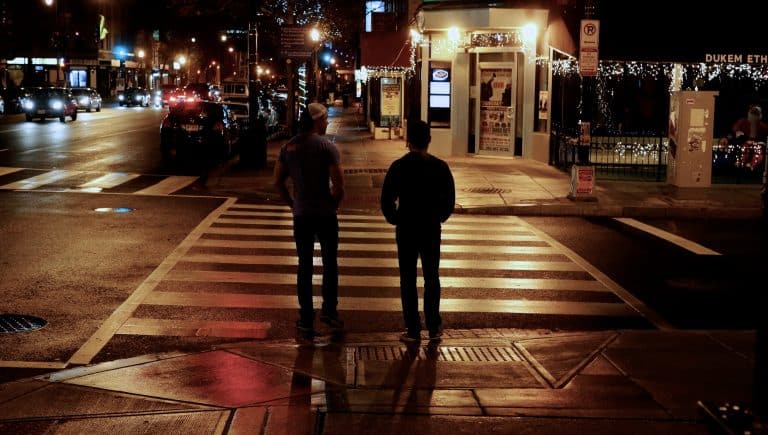
Image by Ted Eytan/Flickr, Attribution-NonCommercial-Sharealike.
How Walking and Talking Allows Men To Be Vulnerable
My senior year in high school, my friend Mariano and I made a habit of walking around St. Paul, Minnesota every Friday evening. It was an odd activity, and our homeboys would often make fun of us for it, but those walks were surreal — they were a disruption from our dysfunctional lives. At around 4 p.m. when classes were over, we’d hop on a bus to the Highland area in St. Paul, and then play basketball for a few hours at the Groveland rec center. After tiring ourselves out, we’d walk a mile down Cleveland Avenue to grab a burrito at Chipotle.
Once refreshed, we’d start the roughly 6-mile walk toward downtown St. Paul. From there, Mariano and I would split paths. He’d take the high bridge up West 7th, heading to the west side of the city. I would get on the late-night bus to the east side, since I had a further trek. Both Mariano and I grew up in strict households. For us, these evening walks were an act of teenage rebellion meets therapy.
Walking past familiar and occasionally new settings, we’d talk about everything. We always started off talking basketball, mainly groaning about another disappointing Minnesota Timberwolves season. (We finally broke the curse!) From there, it would get more personal. I’d share my discomforts at home, fights with my mom, fears of graduation, curiosity of women, and anxieties about losing my virginity. Mariano would listen and offer his thoughts. Then, he’d tell me about his father, his mom’s longing to return to her native El Salvador, his fear of taking responsibility, and uncertainness about his next chapter.
There were times when we’d take the time to compliment one another on certain characteristics we admired in each other. I liked how blasé he was about everything — how he took everything in stride and avoided trouble. He admired my willingness to chase after what I really wanted. As teenagers, it was only right that we also taunted each other for our questionable actions at school. Mariano and I would be so immersed in our conversations that we’d forget that we were walking, until one of us would say, “Yo, ain’t that the bus?” or “Damn, we’re already in downtown?” or our favorite, “Did we really just walk all of St. Paul?” Yes, we did.
From a young age, men are not taught how to process their emotions. Whenever we show signs of vulnerability, we’re often told by parents, teachers, older siblings, and coaches, “Don’t cry,” “Stop being a baby,” “Suck it up,” “Be a man.” These teachings thrust young boys into a competition to be the “manliest” man. As we develop and form bonds with other young men, our relationships are often limited to the outward performance of this manliness. There is little room for sharing intimate feelings and thoughts, so we stockpile them until there is a moment to unleash our anguish.
Last year, a headline in the Boston Globe caught my attention: “The biggest threat facing middle-age men isn’t smoking or obesity. It’s loneliness. As men grow older, they tend to let their friendships lapse. But there’s still time to do something about it.” The author of the piece, Billy Baker, shared his personal experience with loneliness. He stated that somewhere along the way — between graduating from college, getting married, and having kids — his close male friendships had vanished. To better understand this phenomenon, Baker attended conferences on social isolation and learned that male relationships, unlike female relationships, are predicated on doing activities together. The more activities men do together, the closer they become. Baker later revealed that the lack of male closeness is one of the leading reasons why men suffer from early deaths.
After reading Billy Baker’s piece, I inked some thoughts on staying close on LinkedIn. I had already felt some of the loneliness that Billy described. After graduation, all of my close friends had moved to other parts of the country — some even internationally. The lack of male presence in my life was especially difficult for me to overcome. Both in high school and in college, I always had a squad of guys that I hung out with. With just one text message to a group chat, I had grown accustomed to organizing cookouts, evening outings, and athletic activities. Now that we had graduated and gone our separate ways, I was on my own.
This changed last summer, when my friend Randy moved to the Twin Cities for work. In honor of his return, I suggested we go out in downtown Minneapolis with some of our college friends. We stayed out until 3 a.m. snuck up on us, and it was time to head out. As our friends discussed Uber arrangements, I asked Randy if he’d be interested in walking back to his place. He shot me a stupefied look and replied, “Seriously, how far is that?” I laughed at his response and said, “Yeah man. It’s nice out and I’m in the mood to walk. Plus, the University of Minnesota can’t be too far.” My car was in his apartment parking lot, so regardless of his answer, I was walking back to his place. As he weighed his options, he finally said, “Aight Jeff, let’s get it.”
As we walked through downtown Minneapolis and crossed the Mississippi, Randy and I got reacquainted. I’d known Randy for nearly seven years, and I can confidently say that he is one of my closest friends. Sadly, before he had gotten back to Minnesota, we didn’t talk much, apart from the occasional FaceTime call. After graduation, he returned to the east coast and started prepping for the MCAT, before getting a job offer to come work in the Twin Cities.
Randy told me how hard it was living at home with his parents while also taking pre-med classes and studying for the MCAT. Since he was being so open with me, I asked follow-up questions about his family and his ambitions. I was always curious about why he wanted to go to medical school, when it seemed that his passions would be more aligned with writing and research. Randy told me that he found enjoyment in medical procedures and that he felt that it would be a good challenge for him. In the past, he’d always smoothly evade these questions, but on this walk he was transparent about his dreams and vulnerabilities.
I told Randy about my unwillingness to pursue law school, despite my mother’s urging. I talked to him about the challenges of living with all girls, recovering from a nearly fatal car accident, and building a relationship with an older brother I had only seen on vacation to Cameroon. These thoughts had weighed down on me — it was great to share with someone I trusted, instead of suppressing them as I often did. By the time that we got to his apartment, it was 4 a.m. and we’d exchanged all of our highs and lows.
As men, we wear masks to hide the ugliness that lurks beneath them, but we aren’t invincible — we feel, we hurt, we bruise. Some of us use sports as a release, while others toxically rely on sex. Few among us write down how we feel (the wiser men); but still, so many men haven’t found a consistent way to unload their burdens.
To all the men and boys reading this: If you find yourself frustrated or crying out for help, invite your closest friend on a walk. I’m not talking about a walk around the block or a brisk walk around the lake. I’m talking about an hour-long (or more) walk with your closest male friend around the city. Pick a destination, maybe somewhere in your town you’ve never been, venture downtown, or just walk aimlessly — walk, talk, and connect.
There are few things quite as beautiful as walking aimlessly at night in a city. These strolls are even better when you’re trotting alongside a close friend. Both of you dawdling without headphones to drown the happenings of life buzzing around you, phones tucked in your pants pockets to avoid further distraction—just two brothers on a promenade. Late night walks with Mariano and Randy taught me that it is ok to be vulnerable with your bros—in fact; it is necessary for our mental and long-term health.
